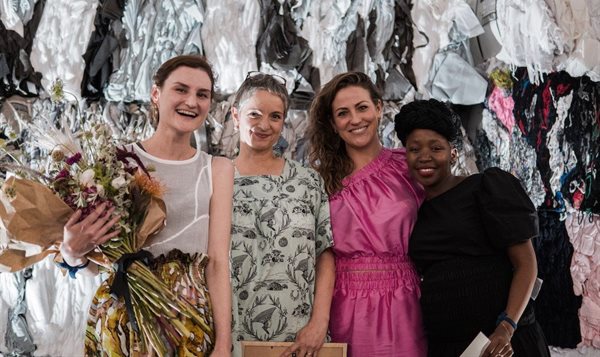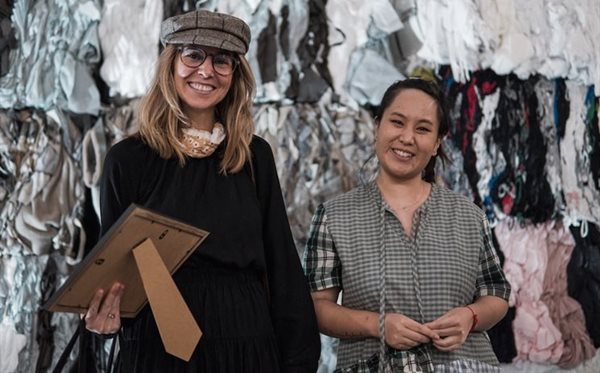
Related




Nigeria’s plastic waste could enrich the fashion industry: here’s how
Solaja Mayowa Oludele 22 Sep 2025


Top stories






More news


Marketing & Media
Ads are coming to AI. Does that really have to be such a bad thing?














The Twyg awards are about acknowledging, celebrating and appreciating designers who are working towards sustaining each other and the planet. The platform celebrates South African designers, retailers and personalities leading sustainable, ethical, circular and regenerative practices in the fashion industry, and reflects the view that fashion can be at the forefront of positive ethical, social and environmental change.
Designer Lara Klawikowski took home the coveted Changemaker Award, a title that came with R100,000 in prize money. The Changemaker Award was not open for nominations. Instead, winners of the Accessory, Innovative Design and Materials, Nicholas Coutts, Trans-seasonal and Student categories were judged against the criteria set for the Changemaker Award.
The judges for the 2020 Twyg Sustainable Fashion Awards were: Prof Desiree Smal, Vice Dean of the Faculty of Art, Design and Architecture at University of Johannesburg; Cyril Naicker, CEO of Imprint Luxury and the country coordinator of Fashion Revolution South Africa; Kelly Fung, freelance content creator and stylist; Fezile Mdletshe-Mkhize, founder of Fezile Fashion Schools, lecturer at Durban University of Technology and founder of Fezile Fashion Schools Academy; and Aaniyah Omardien, the director The Beach Co-op.
The judging process was audited by Elisabeth Makumbi.
The winners of the eight categories for the Twyg Awards 2020 are:
This award recognises a retailer or a retailing initiative that enhances sustainability, including pre-loved/gently worn, “swop shops”, garment rental and similar activities. The award is also open to retailers who support local producers, and sustainable design and manufacturing.
Founded in 1998, Mungo products are designed, woven and finished at a weaving mill in Plettenberg Bay. By introducing organic textiles to the local market, Mungo hopes in turn to increase the demand – which will hopefully lead to more conscious purchasing decisions and ultimately the growing and harvesting of organic cotton in Southern Africa.
This award seeks to recognise a designer who uses techniques that minimise textile waste through innovative pattern cutting, the use of pre- and post-consumer fabric waste, and/or reconstruction techniques. The award also seeks to recognise a commitment to using sustainable fabrics in a collection.
Cape Town-based Lara Klawikowski launched her eponymous brand in 2010 and has since focused on avant-garde wedding dresses and wearable high-art womenswear using unusual materials and textures created by hand at her studio.
"Since a wedding dress is one of the only times someone makes an effort to investigate every detail of what they are wearing, a custom-designed wedding dress made from recycled, upcycled materials, re-fabricated by hand promotes the appreciation of slow fashion," says Klawikowski. She used plastic refuse bags and plastic bags, which she says are an ideal material, as there is transparency about their origin printed on the bags.
This award goes to a student who has produced a garment or collection that addresses the challenges of sustainability in fashion in the most innovative, beautiful and creative way.
Twenty-two-year-old Alex van Heerden is a 4th-year fashion and textile design student at Durban University of Technology. The collection she submitted for her nomination includes garments made from old pillowcases and other thrifted items from the Kloof & Highway SPCA.
“When designing, creating and sewing these garments I hoped that they would challenge and address the throwaway culture present in our society today,” says van Heerden. “One of the many reasons I love fashion is because it allows me to combine two of my greatest passions; the environment and making a difference by doing something that I love and enjoy."
This award recognises an accessory or accessory brand which implements ethical labour practices, limits toxic chemicals and uses sustainable materials to create a quality item and considers end-of-life. Ideally, it should be made of compostable materials, but, if not, it should be made using recyclable or recycled materials.
The Matsidiso brand was founded in 2017 when co-founder Jinae Heyns left her marketing career and identified the potential in her mother-in-law’s shoe factory in Cape Town. The brand’s vision is that through their ethically made shoes, they will have the opportunity to help build the South African economy.

This award recognises a personality who has actively promoted sustainable fashion over the last 12 months and who has sparked relevant conversations. On social media and other platforms, the influencer has explained sustainable issues factually and has cautioned against unsustainable fashion habits. The influencer supports conscious brands while promoting the Rs (reduce, reuse, recycle).
On social media, the Swazi-born model and activist Nomfundo Liyanna Basini is known as Liyanna B. When she is not shooting covers, she chairs the Liyanna B Foundation aimed at spreading awareness and helping survivors of gender-based violence. Her family has been the biggest influence on her life and it is through them that she has learnt thrifting, patching, mending, and swapping.
This award recognises a collection, brand or designer who promotes trans-seasonal and versatile style. It rewards quality garments whose design aspires to be timeless and which are made to last. This category also recognises brands that remain invested in garments after their sale, for example, through the provision of lifetime guarantees or repair services.
Having grown up inspired by his mother, grandmother and trendy aunt to dress like the gentleman they said he is, Tshepo Mohlala founded Tshepo Jeans in 2015. The brand’s manifesto states that it is committed to the development of denim, through the promotion of Africanism and localisation.
The design process is transparent, to ensure accountability at each stage of production. Cotton is sourced from Zimbabwe, dyed in Japan using old indigo dyeing techniques that were originally created in Africa. Fabric is also sourced from one of the world’s most sustainable denim suppliers in Mauritius. Garments are created in the brand’s atelier in Victoria Yards in Johannesburg.
“I’ve always looked at working with something that has a purposes, something that’s going to still be worn and lasts for the next 50 to a 100 years. Something that will outlive me. Truly embodying timelessness. Denim is a fabric that achieves this. Our jeans also become a part of you and your story. And through our jeans your story will always survive,” says Mohlala.
This award recognises a designer who uses artisanal craft techniques such as weaving, embroidering or botanical dyeing to make fashion that foregrounds, celebrates and values the skills of the person who makes the garment.
The Seen Collective is a group of women who make knitwear and jumpers for all seasons. Founded in 2017, the collective consists of designer Steph Mundy and talented women living at the Gerard Fitzpatrick House and Nursing Home in Johannesburg. They use a locally sourced kid mohair and merino wool blend. The yarn comes from the Karoo, where it is hand-spun and hand-dyed by an all-women rural-based business in the Eastern Cape.
The benefits of the work of the collective go far beyond financial. Steph says, “Every member of the collective has discovered a new sense of purpose and pride in producing the work as a group. The Seen Collective places value on an age-old skill done to a high level,” says Mundy.
This award recognises a designer whose career has embraced sustainable and circular design practices. The recipient’s collections will have helped raise awareness of environmental and social issues. Criteria include choice of fabric, ethical labour practices, the extent of upcycling, the reduction of waste, and the use of non-toxic dyes. This designer demonstrates a commitment to promoting slow consumer fashion habits.
Klawikowski also won the Innovative Design and Materials Award.
“I’m extremely grateful to Twyg magazine and Country Road for highlighting my work. The Sustainable Fashion Awards are a wonderful platform for creating awareness of what South African designers are doing to change their design practices for the better and to be more sustainable. Meeting the other finalists and learning about what they do has been inspiring and the prize money will be a great boost for my business, especially after the Covid-19 lockdown," says Klawikowski.
Founder and editor of Twyg, Jackie May commentes, “I’m very proud to have presented the second annual Twyg Sustainable Fashion Awards. It’s an honour to celebrate the work of designers who take care with how they make and design the clothes we wear to ensure that fashion doesn’t harm the planet nor people.”
Sponsors of the Twyg Sustainable Fashion Awards 2020 include Country Road and Petco. Twyg also acknowledges the British Council for its support of Twyg this year.